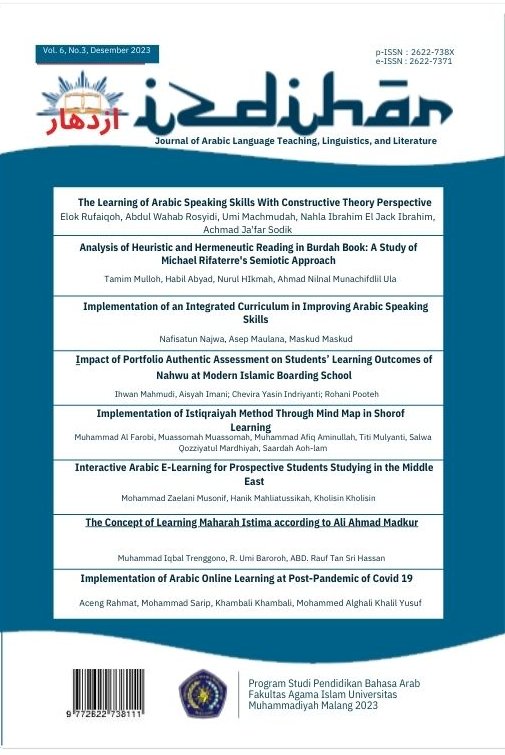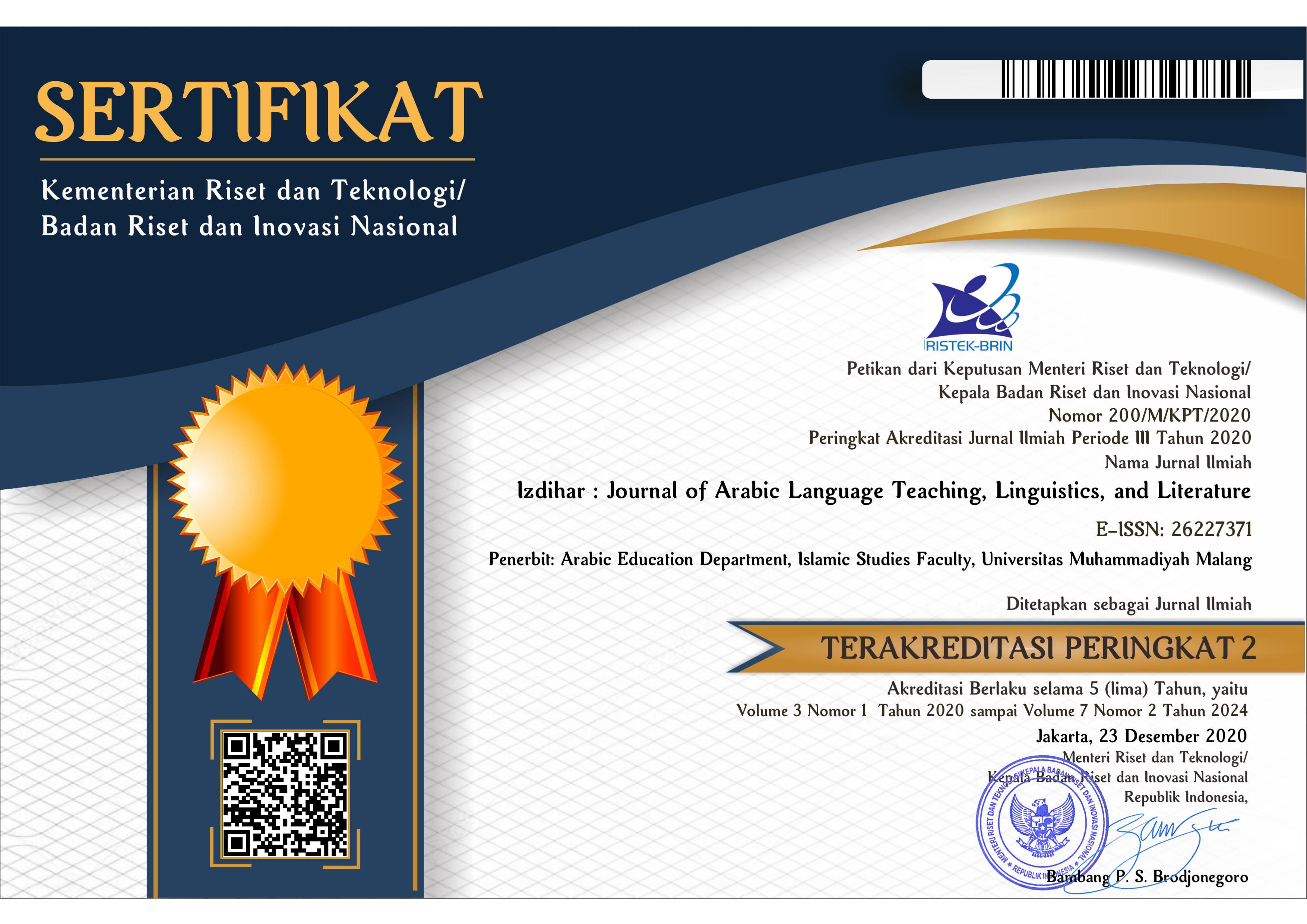The Concept of Learning Maharah Istima according to Ali Ahmad Madkur
DOI:
https://doi.org/10.22219/jiz.v6i3.28964Keywords:
Learning Concept; Maharah Istima’; Ali Ahmad MadkurAbstract
This study aimed to explore more deeply the concept of learning maharah istima Ali Ahmad Madkur. The research is qualitative descriptive research, using qualitative analysis strategy techniques and library research methods. The results showed the concept of learning maharah istima presented by Ali Ahmad Madkur, starting from the essence of maharah istima, the general purpose of learning istima, the objectives and skills of maharah istima at the beginner level, the division of istima, the learning program of istima, and strategies and stages that must be done in maharah istima. The success of Arabic language learning in maharah istima can be achieved when the learning contains meta-cognitive, social-affective, and psychomotor elements. Ali Ahmad Madkur's concept includes meta-cognitive and psychomotor aspects. However, seeing that the affective aspect is not found in Ali Ahmad Madkur's concept, the affective aspect is very important to complement Ali Ahmad Madkur's concept because the affective aspect is very influential on the emotional relationship between teachers and students.
Downloads
References
Ahmad, M., M., H., & Yacoub, H. (2021). The Effect of Using Digital Storytelling on Developing Active Listening and Creative Thinking Skills. European Journal of Educational Research, 10(1), 13–21. https://doi.org/10.12973/eu-jer.10.1.13
Al Khuli, M. A. (1998). Dirasah Al-Lughawaiyyah. Darul Falah Li An-Nash Wa Tauzi’.
Arifin, Z., Febriani, S. R., Desrani, A., Mahmudi, A., & Bedra, K. G. (2022). Critical Tracing of Arabic Language Acquisition in Indonesian Context. Izdihar: Journal of Arabic Language Teaching, Linguistics, and Literature, 5(2), Article 2. https://doi.org/10.22219/jiz.v5i2.20745
Arono, A., Arsyad, S., Syahriman, S., Nadrah, N., Villia, A. S. (2022). Exploring the Effect of Digital Literacy Skill and Learning Style of Students on Their Meta-Cognitive Strategies in Listening. International Journal of Instruction, 15(1), 327–346. https://doi.org/10.29333/iji.2022.15130a
Astuti, W. (2018). INOVASI STRATEGI PEMBELAJARAN BAHASA ARAB MAHARAHISTIMA’. Ihtimam : Jurnal Pendidikan Bahasa Arab, 1(1), Article 1. https://doi.org/10.36668/jih.v1i1.157
Canpolat, M., Kuzu, S., Yıldırım, B., & Canpolat, S. (2015). Active Listening Strategies of Academically Successful University Students. Eurasian Journal of Educational Research, 15(60), 163–180. https://doi.org/10.14689/ejer.2015.60.10
Chalik, S. A. (2021). Metode dan Strategi Pembelajaran Istima’. Jurnal Shaut Al-Arabiyah, 9(2), Article 2. https://doi.org/10.24252/saa.v9i2.31777
Coskun, H., & Uzunyol-Köprü, M. (2021). An Overview of Listening Skills of Secondary School Students: Barriers and Suggestions. Educational Policy Analysis and Strategic Research, 16(4), 49–72. https://doi.org/10.29329/epasr.2021.383.3
Darmiyati Zuchdi, P. D. Z., & Wiwiek Afifah, W. A. (2021). Analisis Konten Etnografi & Grounded Theory, dan Hermeneutika Dalam Penelitian. Bumi Aksara.
Fathoni, M. (2018). Pembelajaran Maharah Istima’. Ihtimam : Jurnal Pendidikan Bahasa Arab, 1(1), Article 1. https://doi.org/10.36668/jih.v1i1.162
Gilakjani, A. P., & Ahmadi, M. R. (2011). A Study of Factors Affecting EFL Learners’ English Listening Comprehension and the Strategies for Improvement. Journal of Language Teaching and Research, 2(5), 977–988. https://doi.org/10.4304/jltr.2.5.977-988
Hamzah, M. S. G., Shamshiri, K., & Noordin, N. (2009). Effects of socio-affective strategy training on listening comprehension. European Journal of Social Sciences, 11, 690–697.
Hasan, H. (2018). Keterampilan Mengajar Bahasa Arab Materi Istima Menggunakan Media Lagu. Al Qalam: Jurnal Ilmiah Keagamaan dan Kemasyarakatan, 127. https://doi.org/10.35931/aq.v0i0.7
Hsueh-Jui, L. (2008). A Study of the Interrelationship Between Listening Strategy Use, Listening Proficiency Levels, and Learning Style.
Hu, X. (2012). The Application of Schema Theory in College English Listening Teaching. Theory and Practice in Language Studies, 2(2), 282–288. https://doi.org/10.4304/tpls.2.2.282-288
Huda, M. (2021). Tahapan perkembangan dan pembelajaran sebagai landasan konsep life long education: Sebuah pemikiran Ali Ahmad Madkur. Tarbawi : Jurnal Pendidikan Islam, 18(1), Article 1. https://doi.org/10.34001/tarbawi.v18i1.1976
Khanna, P. (2020). Techniques and Strategies to Develop Active Listening Skills: The Armour for Effective Communication across Business Organizations. The Achievers Journal: Journal of English Language, Literature and Culture, 6(3), 50–60. https://www.theachieversjournal.com/index.php/taj/article/view/405
Madkur, A. (2008). Tadris Funun al-lughah al-Arabiyyah. https://www.noor-book.com/كتاب-2717-كتاب-تدريس-فنون-اللغه-العربيه-علي-احمد-مدكور-pdf
Nurlaela, N. (2022). Konsep Masyarakat Islami Dan Karakteristiknya Menurut Ali Ahmad Madkur. Al-Afkar, Journal For Islamic Studies, 176–189. https://doi.org/10.31943/afkarjournal.v5i4.364
Pei, T., & Suwanthep, J. (2021). Development of L2 Listening Metacognitive Awareness via Online Metacognitive Listening Practice. International Journal of Distance Education Technologies (IJDET), 19(4), 54–71. https://doi.org/10.4018/IJDET.286741
Qizi, X. N. I., & Ibroximovna, T. N. (2022). Listening Comprehension Problems And Strategies in the Academic Context. Talqin va tadqiqotlar ilmiy-uslubiy jurnali, 2(15), Article 15. https://doi.org/10.5281/zenodo.7491137
Sanwil, T., Utami, R., Hidayat, R., Ahyar, D. B., Rahmi, S., Bukhori, E. M., Febriani, S. R., Nisa, D. K., Mustakim, N., & Syukron, A. A. (2021). Pembelajaran Bahasa Arab Untuk Siswa SD/MI. Yayasan Penerbit Muhammad Zaini.
Serri, F., Boroujeni, A. J., & Hesabi, A. (2012). Cognitive, Metacognitive, and Social/Affective Strategies in Listening Comprehension and Their Relationships with Individual Differences. Theory and Practice in Language Studies, 2(4), 843–849. https://doi.org/10.4304/tpls.2.4.843-849
Setiawan, A. A., Johan. (2018). Metodologi penelitian kualitatif. CV Jejak (Jejak Publisher).
Setyawan, C. E. (2018). KONSEP LANDASAN TEORI DAN RANCANGAN SILABUS PEMBELAJARAN MAHARAH ISTIMA DI PERGURUAN TINGGI. AL-MANAR : Jurnal Komunikasi Dan Pendidikan Islam, 7(1), Article 1. https://journal.staimsyk.ac.id/index.php/almanar/article/view/83
Siyoto, S., & Sodik, M. A. (2015). Dasar Metodologi Penelitian. Literasi Media Publishing.
Sopian, A. (2022). Pemikiran Ali Ahmad Madkur tentang Ilmu Pengetahuan dalam Islam | JIIP - Jurnal Ilmiah Ilmu Pendidikan. http://jiip.stkipyapisdompu.ac.id/jiip/index.php/JIIP/article/view/459
Sumiarni, N., & Syafrawi, A. S. (2019). Efektifitas Pembelajaran Menyimak Dan Berbicara Untuk Pemula (Maharat Al-Istima’ Wa Al-Kalam Li Lmustawa Al-Tamhidi) Berbasis KKNI Pada Mahasiswa Jurusan Pendidikan Bahasa Arab (PBA) IAIN Syekh Nurjati Cirebon. EL-IBTIKAR: Jurnal Pendidikan Bahasa Arab, 8(1), Article 1. https://doi.org/10.24235/ibtikar.v8i1.3910
Topornycky, J., & Golparian, S. (2016). Balancing Openness and Interpretation in Active Listening. Collected Essays on Learning and Teaching, 9, 175–184. https://doi.org/10.22329/celt.v9i0.4430
Wati, R. (2020). Problematika Pembelajaran Istima` Di MTs Al Khoiriyah Pelindung Jaya Lampung Timur Tahun Pelajaran 2019-2020 [Undergraduate, IAIN Metro]. https://repository.metrouniv.ac.id/id/eprint/3818/
Wekke, I. S. (2016). Pembelajaran Bahasa Arab di Madrasah. Deepublish.
Whitehead, E. (2020). Application of Meta-Cognitive Strategy Instruction in Listening Comprehension to the Level III Student Teachers. Excellence in Education Journal, 9(1), 104–119. https://files.eric.ed.gov/fulltext/EJ1246724.pdf
Widiyastuti, R. (2017). Media Pembelajaran Bahasa Arab untuk Kemahiran Menyimak (Maharah Al Istima’).
Yusuf. (2016). Metode Penelitian Kuantitatif, Kualitatif & Penelitian Gabungan. Prenada Media.
Yusuf, D. N., & qomariyah, S. N. Q., S. E. (2021). Analisis Kelayakan Usaha Tanaman Hias pada Brother Farming di Era New Pandemi Covid-19 di Dusun Sukotirto Desa Badang Kecamatan Ngoro Kabupaten Jombang. Lembaga Penelitian dan Pengabdian kepada Masyarakat Universitas KH. A. Wahab Hasbullah.
Zhang, Y. (2012). The Impact of Listening Strategy on Listening Comprehension. Theory and Practice in Language Studies, 2(3), 625–629. https://doi.org/10.4304/tpls.2.3.625-629
Downloads
Published
How to Cite
Issue
Section
License
Copyright (c) 2024 Muhammad Iqbal Trenggono, R. Umi Baroroh, ABD. Rauf Tan Sri Hassan

This work is licensed under a Creative Commons Attribution-ShareAlike 4.0 International License.
Copyright Notice
Authors who publish with this journal agree to the following terms:
- Authors retain copyright and grant the journal right of first publication with the work simultaneously licensed under a Creative Commons Attribution-ShareAlike 4.0 International License that allows others to share the work with an acknowledgment of the work's authorship and initial publication in this journal.
- Authors are able to enter into separate, additional contractual arrangements for the non-exclusive distribution of the journal's published version of the work (e.g., post it to an institutional repository or publish it in a book), with an acknowledgment of its initial publication in this journal.
- Authors are permitted and encouraged to post their work online (e.g., in institutional repositories or on their website) prior to and during the submission process, as it can lead to productive exchanges, as well as earlier and greater citation of published work (See The Effect of Open Access).
Copyright (c) 2019 Izdihar : Journal of Arabic Language Teaching, Linguistics, and Literature

This work is licensed under a Creative Commons Attribution-ShareAlike 4.0 International License.


















